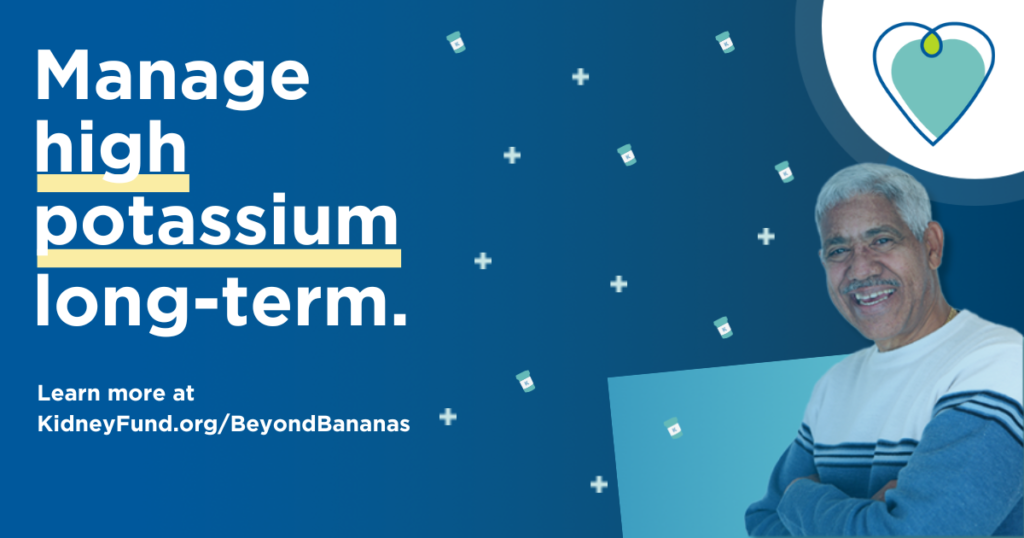Kidney and Heart Disease: How They Are Connected
Guest post provided by Michael Spigler, Vice President of Patient Support and Education, American Kidney Fund

When it comes to taking care of your health, think of heart disease and kidney disease as interconnected partners. If your kidneys don’t function properly, it can lead to issues like high blood pressure and inflammation, putting your heart at risk. Additionally, heart problems can negatively affect your kidneys by reducing blood flow to them.
Having chronic kidney disease (CKD) means that you’re more likely to get heart disease. The reverse is also true: heart disease can cause CKD. In fact, heart disease is the leading cause of death among people on dialysis, a life-saving treatment for people in kidney failure.
However, many people don’t know that the best way to prevent heart disease is to prevent or treat the problems that can cause it, such as diabetes, high blood pressure and anemia.
Consider these facts:
Continue readingGetting Through Seasonal Affective Disorder with Hiking
Contributed by Ryan Peterson.

Photo by Dziana Hasanbekava
Seasonal affective disorder is now recognized as a genuine medical issue. If you aren’t sure what it is, you may already be experiencing it. In the past, it was called the Winter Blues and was dismissed as something trivial. However, recent studies have shown that it can be very detrimental to your health and well-being, as well as affecting your social life and work. You can combat SAD with physical activity and nature, both of which you get en masse with hiking.
What the Heck is SAD?
Commonly known as the Winter Blues, SAD is a depressive condition that feels much like any other. Not much is known about why most people don’t experience it, and some do, but it can be demanding in your life. There is some suggestion that SAD happens because of the shorter days and less exposure to natural light, with some evidence to support this. However, it can be a symptom of other disorders that also require mental health treatment, such as depression.
Why Does SAD Happen?
There is some suggestion that SAD is a response to lack of sunlight. This prevents a part of your brain from working as it should and lowers the amount of melatonin your brain produces. This causes an imbalance among other hormones, such as cortisol and serotonin, which leads to a depressive feeling. The feelings of SAD are very similar to other depressive disorders, such as severe depression and anxiety, and are made worse if you have an existing depressive issue.
Continue reading5 Factors That Impact Heart Health
Are you worried about your heart health?
Heart health is something to think about more as you get older. Increased age equals an increased risk of heart issues. There are certain factors that put you at a higher risk of developing heart disease.
Below are some of the factors that impact heart health and steps you can take to reduce your risk.

High Cholesterol
Heart disease risk increases with high cholesterol levels. High levels of cholesterol may be caused by poor dietary choices. It is important to eat a well-balanced diet rich in fresh fruits and vegetables, high in fiber, with low-fat dairy products and lean meat. You may opt to add healthy smoothies while reducing other unhealthy choices, such as excessive levels of red meat.
Continue readingDefibrillator Types: How do they work?
A defibrillator is a critical piece of life-saving equipment. They are used in most healthcare settings to help support patients suffering from cardiac difficulties. However, there are a wide range of defibrillators on the market today. It can be confusing to navigate and understand the various defibrillator types and how each performs and supports patients.
Here we will discuss the various types of defibrillators currently on the market to help you understand what they do and what circumstances they are most suited to.

What is a defibrillator?
A defibrillator is a medical device designed to send electrical energy, in the form of a shock, to the tissues of the heart. The aim of using this device is to treat cardiac arrest.
The need for this device generally arises when a patient develops life-threatening arrhythmias, such as ventricular tachycardia or ventricular fibrillation that occur when the contractions of the ventricles become irregular.
Defibrillators usually have ECG (electrocardiogram) leads and adhesive paddles (or patches). The adhesive electrodes are patches placed on the patient’s chest before delivering the electric shock.
Defibrillator Types
There are a range of different defibrillator types used today across numerous healthcare settings. These include AEDs (automated external defibrillators), WCDs (wearable cardiac defibrillators), and ICDs (implantable cardioverter-defibrillators). Some other defibrillator types include manual external defibrillators and manual internal defibrillators.
Here we will discuss the major types of defibrillators and the indications and uses of each.
Automated external defibrillators (AED)
These defibrillators use computer technology that makes it easier to analyze the cardiac rhythm and determine if the rhythm is shockable more effectively.
An AED is a battery-operated, portable, lightweight device that checks the cardiac rhythm, and then sends a shock to the tissue of the heart to restore normal heart rate and rhythm. This device is used to help patients suffering from cardiac arrest.
Continue readingWhat Are Some Of The Warning Signs Of A Heart Problem?
Contributed by Ryan Peterson.
As everyone knows, your heart is an organ you cannot live without. It is what pumps blood – and therefore oxygen – around your body, ensuring that all other organs are taken care of. If your heart has a problem, it can be fatal, and it needs to be dealt with as soon as possible.
Sometimes recognizing the warning signs that your heart is in trouble can be difficult. They might be more minor than you would expect, or perhaps you mistake the signs for something else. That’s why it’s important to understand what the signs are so you get help immediately.

Chest Discomfort
There may not be a problem with the heart when you feel a tightness or pinching in your chest. Most of the time, if you’re having trouble breathing, it’s because of a problem with your lungs, especially if you’ve been working out. But it can be a more serious problem.
If the feeling lasts longer than it would normally take for you to catch your breath, or if it happens when you are resting instead of when you are physically active, you seek emergency care. Even if you don’t feel pain, it doesn’t mean there isn’t something wrong with your heart. Many people, especially women, can have a full heart attack without being in pain, so acknowledging this discomfort could be vital.
Continue reading5 Factors to Keep in Mind for Overall Health and Well-Being
Contributed by Ryan Peterson.
There are many things to think about when it comes to your health and well-being. In this blog post, we will discuss five factors that are important for you to keep in mind. These five factors are diet, exercise, stress management, sleep, and social connectedness. Let’s take a closer look at each of these factors!
1) Diet
The food you eat plays a big role in your overall health and well-being. Eating a nutritious diet can help reduce your risk of developing chronic diseases, such as heart disease, stroke, and type 2 diabetes. It is also important to eat a balanced diet to get the nutrients your body needs to function properly. Your heart health, as explained by John A Macoviak, can be improved by eating foods that are low in saturated and trans fats, as well as cholesterol. Eating plenty of fruits and vegetables is also important for maintaining a healthy weight and preventing obesity.

2) Exercise
Regular physical activity is another critical factor for maintaining good health and well-being. Exercise can help you control your weight, reduce your risk of developing chronic diseases, and improve your mental health. Therefore, it is important to find an exercise routine that works for you and stick with it. If you are not used to exercising, start slowly and gradually increasing the intensity and duration of your workouts.
3) Stress management
Chronic stress can take a toll on your physical and mental health. Therefore, it is important to find healthy ways to cope with stress. Some helpful stress management techniques include exercise, meditation, and spending time with friends and family. In addition, it is important to make time for activities that you enjoy and make you feel good. Doing things you enjoy can help reduce stress and improve your overall well-being.
Continue reading


